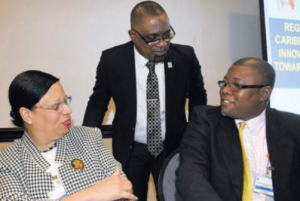Step up’ HIV treatment in Caribbean, PAHO advisor urges
 By KIMONE FRANCIS From Jamaica Observer
By KIMONE FRANCIS From Jamaica Observer
APPROXIMATELY 15,000 Caribbean nationals are infected with human immunodeficiency virus (HIV) each year, and approximately 10,000 living with the dreaded disease die annually.
There are some 310,000 people living with the disease in the Caribbean, and of that number, 73 per cent are aware of their status.
Despite these figures, only 181,000 people in the region are receiving treatment.
Regional advisor on HIV/STI Strategic Information, Pan American Health Organization/World Health Organization (PAHO/WHO), Dr Monica Alonso, wants that figure to increase by 100,000.
“If you actually think about the rate of increase, you only see a positive rate of increase… We’re putting around 18,000 persons on treatment every year, but I mentioned that there are 15,000 infections every year, so we really need to step up and scale up our services in order to meet our targets for ending AIDS,” Dr Alonso said while addressing yesterday’s regional meeting on ending AIDS in the Caribbean at the Jamaica Pegasus hotel in Kingston.
Caribbean countries have committed to the UNAIDS Fast Track targets integrated in the new WHO Global Health Sector Strategy for HIV prevention and control, and the PAHO Regional Plan of Action on HIV and sexually transmitted infections, as milestones towards the longer-term goal of ending AIDS and STIs as public health problems in 2030.
Equally, by 2020, 90 per cent of all people living with HIV should know their HIV status; 90 per cent of all people diagnosed with HIV infection should receive sustained antiretroviral therapy; and 90 per cent of all people receiving antiretroviral therapy should have viral suppression.
Dr Alonso shared that over two-thirds of new infections come from key population — men who have sex with men; sex workers; and transgender persons — and their partners.
“So for gay men… 23 per cent of the new infections in 2017 [were] among gay men; 13 per cent among sex workers; one per cent among transgender women; injected drug use is another one per cent, and our partners another 30 per cent. So this gives us an idea of where we should be focusing our efforts,” she said.
In the meantime, Dr James Guwani, team leader and senior advisor, UNAIDS Sub-Regional Support System Team/Caribbean Sub-Region, said while there has been partial success in saving lives and stopping new infections, the progress counts for little with regard to global condition.
“What is of particular concern is that the region lags behind in terms of viral suppression. We had 70 per cent viral suppression in 2017 compared to the global average of 81 per cent… Stigma, discrimination and restrictive laws continue to be the biggest obstacles to ending AIDS in the region — particularly for young men and members of key population communities,” Dr Guwani said.
He noted that addressing these issues requires funding, but said that the HIV response is experiencing a funding crisis. Dr Guwani said that between 2006 and 2017, international resources in the region decreased by as much as 16 per cent.
IMAGE: Director, Pan Caribbean Partnership against HIV/AIDS Dereck Springer (centre) makes a point to Dr Bernadette Theodore Gandi, Pan American Health Organization/World Health Organization representative to Jamaica, Bermuda and the Cayman Islands, and Dr James Guwani, team leader and senior advisor, UNAIDS Sub-Regional Support System Team/Caribbean Sub-Region, at yesterday’s regional meeting on ending AIDS in the Caribbean at the Jamaica Pegasus hotel in Kingston. (Photos: Garfield Robinson)
For more on this story go to: http://www.jamaicaobserver.com/news/-step-up-hiv-treatment-in-caribbean-paho-advisor-urges_148609?profile=1373





